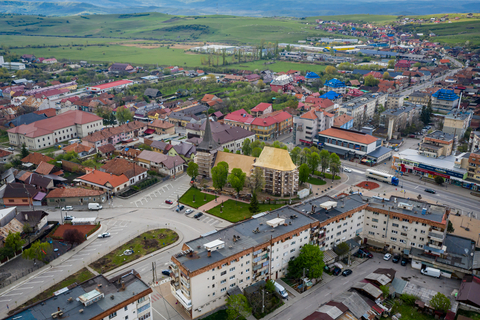Small urban communities are often left out of public discussions on the energy transition. They need greater support to successfully navigate the transformations of the transition, as well as better dialogue with central authorities. Citizens in these small communities also need accessible information so they can make the best decisions about renewable energy, energy efficiency behaviors, and related funding sources. These are some conclusions of the project “Energy education for sustainable urban localities – ENERTOWN”, financed by Innovation Norway and carried out by the Center for the Study of Democracy Association (initiator of the Romanian Energy Poverty Observatory) in partnership with the University of Stavanger (Norway) and the Circular Association – ECERA, together with Servelect, between April 1, 2023 and April 30, 2024.
For one year, ENERTOWN has facilitated a series of interactions between the experts who are part of the project team and the members of the local community in four small towns – Turda, Câmpia Turzii, Gherla, Huedin, as a pilot stage. At the same time, it included an exchange of best practices between representatives of these communities and partners with expertise in local administration in Norway, especially on the occasion of the visit to Norway from October 23-27, 2023.
The interactions that ORSE experts have with members of local communities aim at several phases of action: awareness, diagnosis, building skills, assistance in the development of local policies and their implementation. Through the ENERTOWN project, the experts focused in particular on the first dimension, that of increasing the level of awareness and knowledge about the energy transition, in the context where smaller cities face different challenges than big cities.
In the series of dialogues within the project, meetings were held with citizens, in which representatives of the educational system (including students), local entrepreneurs, representatives of owners’ associations took part. During these meetings, local communities’ own perceptions of the energy transition and its implications for local communities, as well as the impact on quality of life, were gathered.
“Meetings with citizens were the densest in content. They have also helped us to enrich our understanding of how such macro dynamics, often regulated at the European or national level, are perceived at the local level. Even though there is much variation from one local context to another, there is a collective dissatisfaction with the often non-transparent and uncoordinated way in which central level actors (government entities or private companies) communicate with local administrations. ENERTOWN brought to the fore the voice of people from small towns, who often feel marginalized and powerless,” said George Jiglău, president of the Center for the Study of Democracy Association.
Also, several extremely relevant situations were captured, such as the transition to natural gas from Huedin, in the context in which the European and even national level is moving towards giving up gas. Switching from wood to natural gas has a generally positive impact on the quality of life at the local level.
“In the context of the city’s transition to natural gas, wood remains a desirable alternative fuel for locals, especially when prices rise. The locals did not abolish their wood stove, even if they switched to natural gas. This flexibility is especially welcome in contexts such as last year’s rising energy prices. Especially in these mountain areas, winter is longer, this aspect is very important,” added George Jiglău.
At the same time, based on the experience gained in the project, the ENERTOWN team created information materials that will be directed both to local authorities and to community members. The materials have been synthesized in the ENERTOWN Guide.
The guide addresses the challenges of retrofitting buildings to improve thermal efficiency and reduce CO2 emissions, highlighting available technical and financial solutions. The guide includes aspects related to the vulnerable consumer and the impact of energy poverty, emphasizing the need for well-targeted policies and investments in sustainable technologies, as well as access to energy for all. The guide also provides concrete recommendations for reducing energy waste in public and residential buildings.
